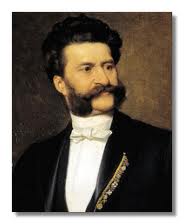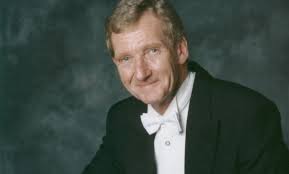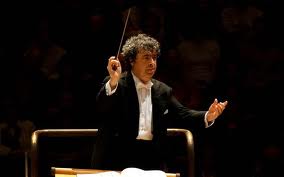Bristol Hippodrome, 6-8 November 2013

A Tudor Ring Cycle? Well not quite, but at over ten hours of music across three evenings it makes for far more than a loosely connected series. Essential to the approach is Madeleine Boyd’s design. A black box, redolent of the RSC in the early seventies, focusses all the attention upon the singers. Costumes, again mostly in black, remove any sense of chocolate-box Tudor or of uncomfortable comparisons with actual history. Alastair Miles’ Enrico is straight out of Game of Thrones rather than any pseudo-naturalistic sixteenth century epic.
At the heart of all three operas is Elisabetta, the Queen, who appears in Anna Bolena in the opening moments as a baby and whose cot is on stage virtually the whole evening. It is she who will become the protagonist of the following two works and it was a stroke of genius by director Alessandro Talevi to make the baby a key element in the opening opera of the trilogy.
The chorus seem to be ever present, making many of the scenes uncomfortably public, and the high orchestra pit (in fact in Bristol there isn’t one!) makes the orchestral sound under Daniele Rustioni’s lively baton even crisper.

The emotional tension of the evening is never allowed to wane even when the musical line appears to be lighter in tone. The overture may seem closer to Rossini than later Verdi, yet there are hints of anger and explosions of brass which prefigure what is to come. Serena Farmocchia’s Anna is distraught from the start, and only during the final mad scene does she show any sense of lightness or the earlier calm which drew her to Enrico in the first place. Robert McPherson has the high tessitura for Percy, but also the sensitivity to convey the constant shifts in emotion. Katherine Goeldner’s Giovanna is equally torn between her love for Enrico (difficult to understand given his characterisation) and her feelings for her friend Anna. Both women developed as the evening progressed and their final long duet was very moving. If Enrico’s authoritarian violence is the key to the work, he does not have the last word. In a blaze of red silk, Anna performs a mad scene and coda which is as formidable as the demise of Dido or Brunnhilde. Serena Farmocchia had saved the best to last and convinced us not only that this is a magnificent work, but the final scene is one of the greatest from the belcanto repertoire.

With Maria Stuarda we are demonstrably in the same world if now a generation on. Elisabetta is as vicious and nasty as her father, and is surrounded by a court as suspicious and ever-present. But there is some change. Where earlier there had been a connection to the outside world, now we have two small chambers, cells almost, back to back, endlessly circling one another. Each is the prison for a queen, for Elisabetta is as much a prisoner as Maria. In the opening act there is little sympathy for either woman. They are as arrogant and dismissive of would be supporters as each other. The confrontation of the queens towards the end of act one is a marvellous piece of writing, but as we have little sympathy for either it fails to make a great deal of impact. Only in act two does Maria begin to gain our emotional interest as she moves inevitably towards her death. In Rudolf Frey’s production Talbot – the ever reliable Alastair Miles – becomes her father confessor and confidant, convincingly so in the final scene. The great prayer in act two becomes the climax of the evening, and even Roberto’s suicide does not eclipse it.
If the final moments do not quite succeed this is only because the revolve could not whisk the execution away fast enough.
Adina Nitescu has a large, powerful voice but displayed little subtlety as Elisabetta. There was no sense of a human being learning as events unfold and she seemed as two-dimensional at the end as at the start. By contrast Judith Howarth’s Maria slowly unfolds before us, becoming a genuinely tragic figure as she goes to her death. Ignore history, this is a convincing portrayal of a woman out of her depths within political intrigue. Bruce Sledge’s Roberto is probably the most sympathetic character before us but as with Maria has a world against him.
Orchestra and chorus under Graeme Jenkins were in fine, brisk form, making much of the opportunities Donizetti provides for them.

There may be only a few years between Anna Bolena and Roberto Devereux but the change in musical style is marked. Where much of the earlier work could be taken for Rossini, in Devereux we are distinctly Verdian. Nottingham’s great aria and his later scene with Sarah could comfortably sit in any early or mid-period Verdi opera, and were finely sung by David Kempster and Leah-Marian Jones. Moreover, the work really does make sense as the culmination of a trilogy, not thought-through in the way of the Ring Cycle but psychologically apt as we see Elisabetta progress from bastard child, through ranting autocrat to near-insane tarantula trying to control the world around her even as she withers towards death.
Alexandra Deshorties gave probably the best performance of the week as Elisabetta, her ferocity and power equalling her thrilling coloratura. Wearing what appeared to be the tattered remnants of the dress her mother wore to the scaffold, she reduces the authority of a queen to the emotions of a love-sick school-girl and drags the world down with her.
The image of the tarantula is telling. Potentially highly dangerous, it can only survive if fed from outside and kept in cocooned captivity, like the queen herself.
Leonardo Capalbo’s Roberto is equally a fish out of water, surrounded by courtiers who have been there from the start and will continue once Elisabetta has died. His vocal heroism was convincing but he stood no chance within the subtle politics around him.
As on all three evenings the chorus was not only in fine voice but an ever-present threat to wayward individuals. Daniele Rustioni was very obvious in the shallow pit and was clearly enjoying himself as he guided his forces to ever greater intensity.
The experiment of staging the trilogy may not have brought the audiences or financial results it deserved, but those of us who experienced it are all very grateful for the opportunity which I suspect will not come again. BH




















